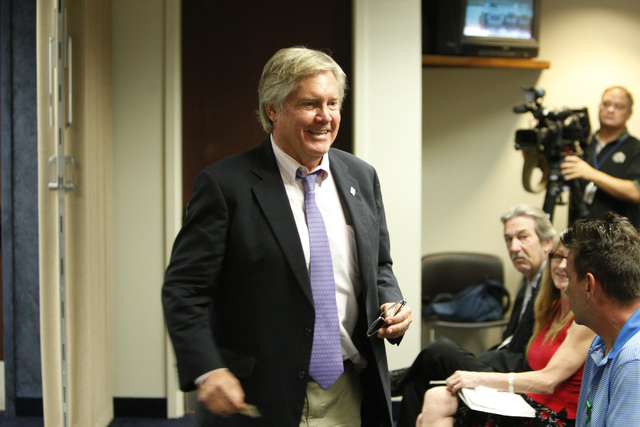State lawmaker pitches idea to settle dispute over medical marijuana permits
The standoff between the state and Clark County over who gets to license medical marijuana dispensaries may soon be resolved with help from Nevada lawmakers.
Sen. Tick Segerblom, D-Las Vegas, said he may push legislation giving cities and counties the option of a one-time increase in the number of dispensaries allowed in their jurisdictions. The additional dispensary operators would be selected from the pool of applicants who sought entry into the field in 2014, when Nevada started its licensing process.
For unincorporated Clark County, that would allow the county 18 dispensaries instead of the 10 now approved — effectively granting the county the power to land all 18 dispensaries it expected to have under a 2013 state law.
Last year nearly 80 applicants sought county permits. Clark County in June gave permits to its top 18 choices, looking at factors such as zoning and location, but made no decision about the remaining applicants, nearly 60 in all.
Under the law, the state and county must agree on the permits, but the state Division of Public and Behavioral Health endorsed only 10 of the county’s 18 picks. The county, in response, rejected the eight applicants the state wanted to round out the field.
Segerblom’s proposal would give more power to local jurisdictions, allowing them to pick dispensaries. For Clark County, that would mean the County Commission could chose eight more applicants from the pool of 27 ranked and not outright rejected by the state.
Segerblom’s concept would also mean a net increase in dispensaries statewide because he wants to let all cities and counties grow their dispensary numbers by at least 50 percent, or double the authorized strength in rural counties now allowed just one.
Segerblom, who spearheaded medical marijuana legislation in 2013, stressed that his idea is still a concept and may change after discussions with all of the parties. If it moves forward, he plans to introduce a bill in the 2015 Nevada Legislature, which convenes next month.
“Everybody seems to like the idea, but the devil’s in the details,” Segerblom said. “Who knows what will happen?”
Local jurisdictions would have the discretion of whether to do the increase or not; it wouldn’t be mandatory.
When picking their dispensaries, cities and counties could use criteria such as location, ties to the community and diversity.
Trevor Hayes, an attorney for Wellness Connection of Nevada, represents a company that has a state provisional certificate but not county approval.
He said he appreciates Segerblom’s desire to find a solution to the problem and improve access for patients. However, Hayes said he has concerns that the model should give more weight to how high the state ranked a dispensary applicant.
County Commission Chairman Steve Sisolak said he’s still learning more about the idea, adding he doesn’t know how legislative leadership will respond. But he called it a “potential solution.”
“I’m in favor of anything that could potentially bring an amicable resolution to the situation we find ourselves in,” Sisolak said.
Commissioner Chris Giunchigliani said Segerblom’s idea has potential, but a long-term fix to add clarity to the process in the years ahead is needed.
The situation involving the county and state has sparked a lawsuit against the state Division of Public and Behavioral Health from applicants who have county approval, but who didn’t make it on the state’s list of top picks.
The process has sparked much confusion in recent months.
Records show that state officials have made contradictory remarks about how much weight state officials would give local preferences in ranking dispensary applicants. In public meetings state officials suggested they would simply move down the list and issue more provisional certificates if applicants lacked local approval.
Clark County tried to clarify the process, asking if it could still rely on those statements as expressing the state’s intent. But by the time the state responded, state officials said no — the 90-day period in law for reviewing applications was closed.
Contact Ben Botkin at bbotkin@reviewjournal.com or 702-405-9781. Find him on Twitter: @BenBotkin1.
Pot news
Want to know more? Read all of our coverage here.























